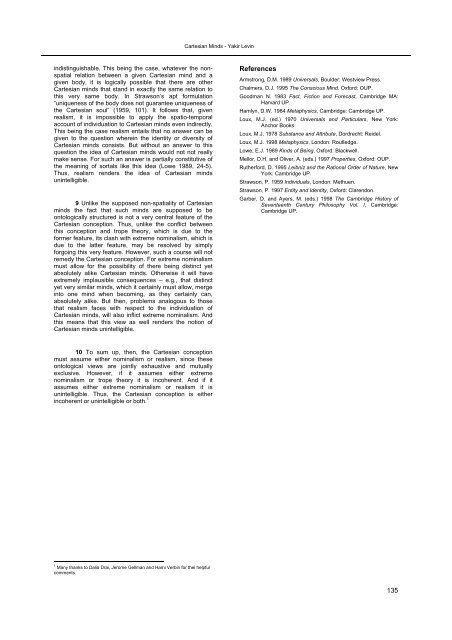Persons. An Interdisciplinary Approach - Austrian Ludwig ...
Persons. An Interdisciplinary Approach - Austrian Ludwig ...
Persons. An Interdisciplinary Approach - Austrian Ludwig ...
You also want an ePaper? Increase the reach of your titles
YUMPU automatically turns print PDFs into web optimized ePapers that Google loves.
indistinguishable. This being the case, whatever the nonspatial<br />
relation between a given Cartesian mind and a<br />
given body, it is logically possible that there are other<br />
Cartesian minds that stand in exactly the same relation to<br />
this very same body. In Strawson’s apt formulation<br />
“uniqueness of the body does not guarantee uniqueness of<br />
the Cartesian soul” (1959, 101). It follows that, given<br />
realism, it is impossible to apply the spatio-temporal<br />
account of individuation to Cartesian minds even indirectly.<br />
This being the case realism entails that no answer can be<br />
given to the question wherein the identity or diversity of<br />
Cartesian minds consists. But without an answer to this<br />
question the idea of Cartesian minds would not not really<br />
make sense. For such an answer is partially constitutive of<br />
the meaning of sortals like this idea (Lowe 1989, 24-5).<br />
Thus, realism renders the idea of Cartesian minds<br />
unintelligible.<br />
9 Unlike the supposed non-spatiality of Cartesian<br />
minds the fact that such minds are supposed to be<br />
ontologically structured is not a very central feature of the<br />
Cartesian conception. Thus, unlike the conflict between<br />
this conception and trope theory, which is due to the<br />
former feature, its clash with extreme nominalism, which is<br />
due to the latter feature, may be resolved by simply<br />
forgoing this very feature. However, such a course will not<br />
remedy the Cartesian conception. For extreme nominalism<br />
must allow for the possibility of there being distinct yet<br />
absolutely alike Cartesian minds. Otherwise it will have<br />
extremely implausible consequences – e.g., that distinct<br />
yet very similar minds, which it certainly must allow, merge<br />
into one mind when becoming, as they certainly can,<br />
absolutely alike. But then, problems analogous to those<br />
that realism faces with respect to the individuation of<br />
Cartesian minds, will also inflict extreme nominalism. <strong>An</strong>d<br />
this means that this view as well renders the notion of<br />
Cartesian minds unintelligible.<br />
10 To sum up, then, the Cartesian conception<br />
must assume either nominalism or realism, since these<br />
ontological views are jointly exhaustive and mutually<br />
exclusive. However, if it assumes either extreme<br />
nominalism or trope theory it is incoherent. <strong>An</strong>d if it<br />
assumes either extreme nominalism or realism it is<br />
unintelligible. Thus, the Cartesian conception is either<br />
incoherent or unintelligible or both. 1<br />
1<br />
Many thanks to Dalia Drai, Jerome Gellman and Hami Verbin for thei helpful<br />
comments.<br />
Cartesian Minds - Yakir Levin<br />
References<br />
Armstrong, D.M. 1989 Universals, Boulder: Westview Press.<br />
Chalmers, D.J. 1995 The Conscious Mind, Oxford: OUP.<br />
Goodman N. 1983 Fact, Fiction and Forecast, Cambridge MA:<br />
Harvard UP.<br />
Hamlyn, D.W. 1984 Metaphysics, Cambridge: Cambridge UP.<br />
Loux, M.J. (ed.) 1970 Universals and Particulars, New York:<br />
<strong>An</strong>chor Books.<br />
Loux, M.J. 1978 Substance and Attribute, Dordrecht: Reidel.<br />
Loux, M.J. 1998 Metaphysics, London: Routledge.<br />
Lowe, E.J. 1989 Kinds of Being, Oxford: Blackwell.<br />
Mellor, D.H. and Oliver, A. (eds.) 1997 Properties, Oxford: OUP.<br />
Rutherford, D. 1995 Leibniz and the Rational Order of Nature, New<br />
York: Cambridge UP.<br />
Strawson, P. 1959 Individuals, London: Methuen.<br />
Strawson, P. 1997 Entity and Identity, Oxford: Clarendon.<br />
Garber, D. and Ayers, M. (eds.) 1998 The Cambridge History of<br />
Seventeenth Century Philosophy Vol. I, Cambridge:<br />
Cambridge UP.<br />
135












